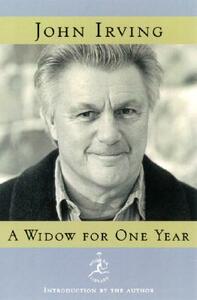Take a photo of a barcode or cover
I got off on a bad start with this book. I'd seen the movie - which is based on the first part of the book - years ago and really liked it. I think that I remembered the details of the story too well... And though I enjoyed it and the characters, it seemed a bit slow. I remembered that I've felt that way before about John Irving's novels: I'd love the stories but the writing dragged a bit... So I decided to give up reading the paperback and bought it on audio instead. And that changed everything! I guess to me, John Irving is an author whose novels I prefer as audio books. (Another author I feel this way about is [a:Haruki Murakami|3354|Haruki Murakami|http://photo.goodreads.com/authors/1345785622p2/3354.jpg].)
But back to the story: In short, the book is about Ruth, a novelist whose life is marked by her unhappy family and a great tragedy, the same family and tragedy that marks and shapes Eddie's life and sexuality. It's difficult to describe the story - just as difficult as it is to describe a life. And that's just what the novel does: It describes Ruth (and in part Eddie's) life, her work and her relationships with other people.
I actually didn't care much about Eddie's story, but Ruth stole my heart! I loved her, her friends, her story and almost everything about her. And the descriptions of her novels made me long to read them! Almost more than I longed to read this novel ;-)
But back to the story: In short, the book is about Ruth, a novelist whose life is marked by her unhappy family and a great tragedy, the same family and tragedy that marks and shapes Eddie's life and sexuality. It's difficult to describe the story - just as difficult as it is to describe a life. And that's just what the novel does: It describes Ruth (and in part Eddie's) life, her work and her relationships with other people.
I actually didn't care much about Eddie's story, but Ruth stole my heart! I loved her, her friends, her story and almost everything about her. And the descriptions of her novels made me long to read them! Almost more than I longed to read this novel ;-)
I've said it before and I'll say it again, John Irving is a master storyteller. I dont think this book was his best effort by any means, but there's something about Irving novels that ensnares you. The characters he creates are so realized and fully dimensional, that a type of literary love blossoms while delving into his thick tomes. Sometimes they can be tedious, but once they are done there is a sense of loss; these people, always flawed and nearly always upper middle class, are such a wonderful analysis of what it means to be human, that when they are gone the tedium seems to dissapear and a desire for more emerges.
If you've ever considered being a writer, you'll love this Irving book. And hopefully, it will inspire you to write!
Not one of [a:John Irving|3075|John Irving|http://d.gr-assets.com/authors/1257375547p2/3075.jpg]'s better books, IMO. His writing is always a pleasure but this one was just so long and kind of all over the place.
An enjoyable book, although I'd have liked it to be edited more strictly, losing a quarter or a third. It is an epic. It starts with an assistant to a writer who becomes the writer's wife's lover. (I saw it in a film too, I'm quite sure.)
Not as good as Prayer for Owen Meany but still great. Loved the ending but the middle in Amsterdam could have been left out.
Loved the exploration of her family and how we deal with grief.
Loved the exploration of her family and how we deal with grief.
Great character development. One of my favorite things about John Irving is that I can never predict what will happen next.
It took about 300 pages before I felt this book started to get good. The last 100 pages or so, things move along in a predictable but really happy sort of way, and there's some really lovely quotes throughout. Makes me really want to read Graham Greene. And also, perhaps for someone who is interested in becoming a writer, it's indirectly very informative. If not also a bit unbelievable at times. But at 500+ pages I don't think you can expect there to not be a few too many "coincidences."
I just finished reading this for the second time and thoroughly enjoyed it. I was given it by a friend back in 1999 as I departed for Sochi, Russia. I read it whilst I was there and, if I remember correctly, it was my first John Irving novel. (I've since read The World According to Garp and The Fourth Hand).
The story is about a writer, who gets a job with a writer as a writer's assistant and falls in love with the writer's wife (who, later, becomes a writer). The husband and wife have a four-year-old daughter, Ruth, who... yep, you guessed it, becomes a writer. Ruth writes books about a writer.
But seriously though, it's a serious book about love and relationships. It's contains a lot of sadness but there's a thread of humour that runs throughout.
The way Irving deals with characters and their relationships really draws you in. I like his novels for reading on holiday as they're not that demanding but they draw you right in and, to use the cliché, are hard to put down. This book seems superficial on the surface, but really it's quite deep and it stays with you. I'm afflicted with a terrible memory (which is why I can enjoy rereading novels so much) but I did remember a few things about this book, particularly about how the two brothers were killed. (They die before the novel beings and their presence is felt throughout the entire first part).
I would highly recommend this for reading on the plane or bus or boat, or sat by the pool somewhere away from it all. But wherever, it's a great read.
The story is about a writer, who gets a job with a writer as a writer's assistant and falls in love with the writer's wife (who, later, becomes a writer). The husband and wife have a four-year-old daughter, Ruth, who... yep, you guessed it, becomes a writer. Ruth writes books about a writer.
But seriously though, it's a serious book about love and relationships. It's contains a lot of sadness but there's a thread of humour that runs throughout.
The way Irving deals with characters and their relationships really draws you in. I like his novels for reading on holiday as they're not that demanding but they draw you right in and, to use the cliché, are hard to put down. This book seems superficial on the surface, but really it's quite deep and it stays with you. I'm afflicted with a terrible memory (which is why I can enjoy rereading novels so much) but I did remember a few things about this book, particularly about how the two brothers were killed. (They die before the novel beings and their presence is felt throughout the entire first part).
I would highly recommend this for reading on the plane or bus or boat, or sat by the pool somewhere away from it all. But wherever, it's a great read.
This is the only Irving novel I've read so far, but I plan to read more in the future. I read "A widow for one year" about a year ago, and I picked it unknowingly in the bookshop without knowing anything about the author, his style or the story. To be honest, I picked it up just because:
a) It was long and it was summer
b) It began with the sentence "One night when she was four and sleeping in the bottom bunk of her bunk bed, Ruth Cole woke to the sound of lovemaking -it was coming from her parents' bedroom".
You can beat a beginning like that one, but it's gonna be hard.
So I did what I'm not used to do: I entered a literary work without any clues whatsoever. It was great.
John Irving is a story-teller, in the widest sense. He takes a character and builds a story around him, normally adding loads of special characters to accompany him. He tells the story with slow, careful writing, paying the right attention to details (the brother's stories and how Ruth memorises the stories through the photographs, just genious) and keeping the reader interested. His stories are long, and he might get a bit tough from time to time, but it's worth it. What I loved the most was how true, how honest, how real his characters were. Neither good nor bad, just people living hard situations and not always taking the right road.
I preferred the first part of the book, which focuses on Ruth's parents relationship, rather than the second one (when Ruth is actually old enough to have her own relationships). That might have been because I liked the parents best, and I found both of them appealing and intriguing, I wanted to know what was wrong with them.
a) It was long and it was summer
b) It began with the sentence "One night when she was four and sleeping in the bottom bunk of her bunk bed, Ruth Cole woke to the sound of lovemaking -it was coming from her parents' bedroom".
You can beat a beginning like that one, but it's gonna be hard.
So I did what I'm not used to do: I entered a literary work without any clues whatsoever. It was great.
John Irving is a story-teller, in the widest sense. He takes a character and builds a story around him, normally adding loads of special characters to accompany him. He tells the story with slow, careful writing, paying the right attention to details (the brother's stories and how Ruth memorises the stories through the photographs, just genious) and keeping the reader interested. His stories are long, and he might get a bit tough from time to time, but it's worth it. What I loved the most was how true, how honest, how real his characters were. Neither good nor bad, just people living hard situations and not always taking the right road.
I preferred the first part of the book, which focuses on Ruth's parents relationship, rather than the second one (when Ruth is actually old enough to have her own relationships). That might have been because I liked the parents best, and I found both of them appealing and intriguing, I wanted to know what was wrong with them.




